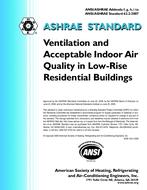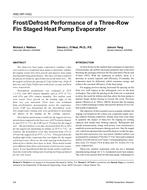An earlier publication, Goldschmidt et al. presented comparative data forwintertime infiltration rates in two mobile homes and described the test set-upand procedure. For completeness, Fig. 1-4 of that preceeding publication anddescriptions of the measurement procedure of the homes are presented in theAppendix of this paper.
The major objectives of the study were two: 1) to determine through a comprehensiveset of tools, the dependence of infiltration rate on weather and 2)to quantify the benefits of using a continuous sheathing board in the roof andwalls to reduce infiltration, hence energy consumption for HVAC.
In this particular study the residences tested were unoccupied, free fromobstructions to wind by terrain or other buildings, and had windows on allsides. As a result, the dependence on wind direction was small compared tothat on wind magnitude
The homes were tested under different configurations. The North home was assembledwith caulking used as a sealant at all joints. It was alternativelytested with or without skirting (obtained and installed by a local mobile homedealer). The South home was assembled with continuous sheathing board and nocaulking. In this manner the comparative benefit of continuous sheathing boardon reducing infiltration rate could be estimated. (Skirting was also added tothe South home).
This paper reports pooled data for skirted and unskirted units (summer), and compares that to data from another paper for skirted units only.
Citation: Symposium, ASHRAE Transactions, Volume 85, Part 1, Philadelphia, PA
Product Details
- Published:
- 1979
- Number of Pages:
- 11
- File Size:
- 1 file , 460 KB
- Product Code(s):
- D-PH-79-10-4


